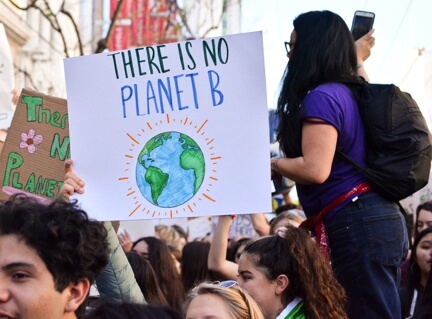Church Teaching Supports Global Treaties
by Roma De Robertis, SCIC, Saint John, N.B.
Volume 35 Issue 7, 8 & 9 | Posted: October 4, 2021

Facing many tragedies and disasters today, how might we pray and act with others for urgently needed transformation? Hope can be found in two vital international treaties which are highly consistent with Catholic teaching.
The first is the United Nations Treaty on the Prohibition of Nuclear Weapons which entered into force in January this year. The second and more recent is the Fossil Fuel Non-Proliferation Treaty, which seeks to phase out fossil fuels while supporting a just transition.
Recently, we commemorated the atomic bombings of Hiroshima and Nagasaki, Japan on Aug. 6 and 9, 1945. Although the global Treaty on the Non-Proliferation of Nuclear Weapons has been in force since 1970, there are estimates of more than 13,000 such weapons still on earth today. As this threat continues to loom, the world also faces catastrophic suffering and destruction from climate change.
Historically, Canada played a large role in the Manhattan Project leading to the first weapons of mass destruction. In August 1943, Canada hosted a meeting of the United States and Britain to discuss developing nuclear weapons during the Second World War.
According to the Canadian Nuclear Safety Commission, Canada also supplied and refined uranium for use in U.S. facilities as nuclear fuel. Canada continued to supply uranium for military purposes for two decades after the war.
Although Canada does not possess nuclear weapons, it declines to sign or ratify the UN Treaty on the Prohibition of Nuclear Weapons. The federal government claims as a NATO member, Canada needs protection from the large American nuclear arsenal. However, this year many American Catholic leaders joined scientists in urging President Joe Biden to work with other nations toward nuclear disarmament.
Pope Francis has condemned both possession of nuclear weapons as well as threats to use them. Japan’s Catholic bishops have gone further to call for an end to nuclear power. Not only did their country suffer two atomic bombings, but also faced the major Fukushima nuclear power plant meltdown in 2011.
Pope Francis publicly highlighted the bishops’ call to halt nuclear power when he visited Japan in November 2019. Later, he told journalists he personally questioned the safety of nuclear energy, noting its potential for further disaster.
Meanwhile, Canada’s federal government and four provinces are spending millions of dollars in public funds to finance nuclear energy expansion. Two nuclear technology companies from the United Kingdom and U.S. have offices in Saint John, N.B. to develop small modular nuclear reactors (SMNRs).
The nuclear industry promises carbon-free electricity generation from SMNRs to address climate change. New Brunswick, Ontario, Saskatchewan and Alberta signed an agreement to promote SMNRs.
The new reactors will take at least 10 years to complete. However, proponents of nuclear-free renewable energy emphasize the urgent need for immediate climate action, combined with energy efficiency. They note there is no safe solution for permanent storage of nuclear waste, which remains dangerously radioactive for countless generations.
Making Choices
They also warn of potential misuse of plutonium by terrorists or unstable regimes. Plutonium is a human-made element created as a by-product in every nuclear reactor. In the world’s nuclear weapons, it is the main nuclear explosive material.
The Moltex Energy company wants to extract plutonium from thousands of used nuclear fuel bundles stored at Point Lepreau, N.B. on the Bay of Fundy. Through such reprocessing, it plans to use the plutonium as fuel for an SMNR now still in the design stage. The entire package could then be replicated and sold to other countries.
However, American scientists and non-proliferation experts say Canadian government support for the Moltex plutonium-extraction project undermines the global nuclear weapons non-proliferation regime. Nine U.S. non-proliferation experts expressed their serious concerns in two open letters to Prime Minister Justin Trudeau dated May 25 and July 28 this year.
In their first letter, they urged the Canadian government “to convene high-level reviews of both the non-proliferation and environmental implications of Moltex’s reprocessing proposal.” Such reviews “will find reprocessing to be counterproductive on both fronts,” they said.
Their second letter questions “misleading claims” by Moltex. They emphasized that “Moltex’s proposal would not significantly reduce the risk from radioactive waste but would dramatically increase the risk of nuclear weapons proliferation.”
Another key movement to avoid widespread destruction lies in the global Fossil Fuel Non-Proliferation Treaty. The treaty website declares that “bold and immediate action is needed to address the climate emergency” mainly caused by fossil fuels.
Supporters include more than 100 Nobel Prize laureates, thousands of individuals and hundreds of organizations. These include the cities of Vancouver and Toronto; the Sisters of Charity Federation of North America; the Global Catholic Climate Movement (newly named the Laudato Si’ Movement), as well as KAIROS: Canadian Ecumenical Justice Initiatives.
The Vatican has called divesting from fossil fuels both a moral and theological imperative to counter widespread suffering and destruction from climate change. An urgent call to divest came this spring from the Vatican Dicastery for Promoting Integral Human Development.
Inspired by the 2015 encyclical by Pope Francis, the Vatican’s Laudato Si’ Action Platform recommends divesting from fossil fuels while investing in renewable energy. To learn more, see www.laudatosiactionplatform.org
Set before us today are life or death; blessing or curse (Deuteronomy 30:19). What will we choose?
by Roma De Robertis, SCIC, Saint John, N.B.
